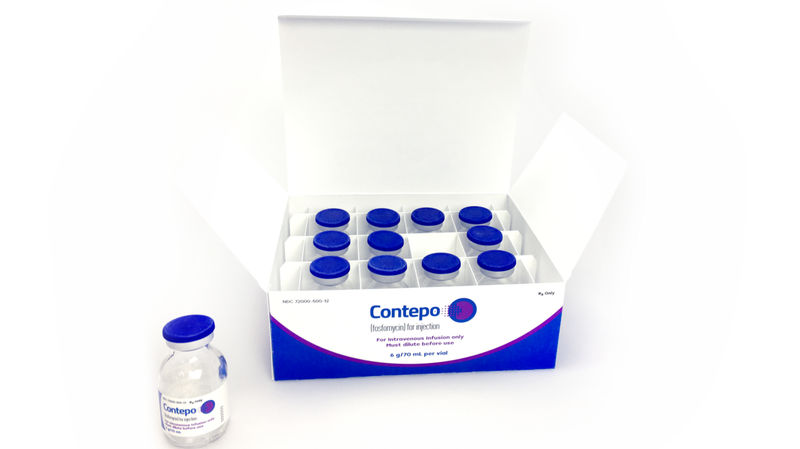FDA Approves Contepo (fosfomycin) for Injection for the Treatment of Complicated Urinary Tract Infections
October 22, 2025 -- The U.S. Food and Drug Administration (FDA) has approved Contepo (fosfomycin) for injection for the treatment of patients 18 years of age and older with complicated urinary tract infections (cUTI), including acute pyelonephritis, caused by susceptible isolates of Escherichia coli and Klebsiella pneumoniae.
Contepo is an epoxide antibacterial that works by disrupting bacterial cell wall synthesis through covalently binding and inhibiting phosphoenolpyruvate transferase (MurA), thereby blocking the synthesis of peptidoglycan. The drug is bactericidal against Enterobacterales.
Dosing and Administration
The recommended dosage of Contepo is 6 grams administered every 8 hours by intravenous infusion over 1 hour in patients 18 years of age or older with an estimated creatinine clearance greater than 50 mL/min. The duration of therapy is up to 14 days and should be guided by the severity of infection and the patient's clinical status. Dosage adjustments are required for patients with renal impairment.
Clinical Trial Results
The FDA approval was based on data from a multinational, double-blind clinical trial (Trial 1) that enrolled 464 adults hospitalized with cUTI, including acute pyelonephritis. The study compared Contepo 6 grams intravenously every 8 hours to piperacillin/tazobactam 4.5 grams intravenously every 8 hours for 7 days of therapy, with treatment allowed for up to 14 days in bacteremic patients.
In the microbiological modified intent-to-treat (mMITT) population of 339 patients, Contepo demonstrated efficacy with regard to overall response at the test-of-cure visit. Overall success, defined as clinical cure plus microbiological eradication, was achieved in 63.5% (108/170) of Contepo-treated patients compared to 55.6% (94/169) of piperacillin/tazobactam-treated patients.
Important Safety Information
The most common adverse reactions (incidence ≥2%) observed in clinical trials were transaminase elevations, hypokalemia, neutropenia, nausea, vomiting, diarrhea, hypocalcemia, hypernatremia, headache, and hypophosphatemia.
Contepo contains 1,980 mg of sodium in each vial. The high sodium load associated with its use may result in changes in serum electrolytes, such as increased levels of serum sodium and decreased levels of potassium, calcium, and phosphorus. A low-sodium diet is recommended during Contepo treatment, and healthcare providers should monitor serum electrolyte levels and fluid status during treatment.
Contepo has been shown to prolong the QT interval in some patients and should be avoided in patients with known QT prolongation or ventricular arrhythmias, including a history of torsade de pointes. Healthcare providers should monitor electrolytes during treatment with Contepo.
Contepo is contraindicated in patients with known serious hypersensitivity to fosfomycin or any of the excipients.
Postmarketing Requirements
As part of the approval, the FDA has required Meitheal Pharmaceuticals to conduct postmarketing studies, including:
- Pediatric pharmacokinetic and safety studies in children from birth to less than 18 years of age
- A clinical lactation study to determine fosfomycin concentrations in human milk
- A five-year U.S. surveillance study to monitor resistance or decreased susceptibility to fosfomycin in target bacterial populations
About Complicated Urinary Tract Infections
Complicated urinary tract infections are infections of the urinary tract that occur in patients with structural or functional abnormalities of the urinary tract or with underlying diseases that increase the risk of acquiring infection or failing therapy. Acute pyelonephritis is a severe form of urinary tract infection involving the kidney.
Source: Drugs.com


